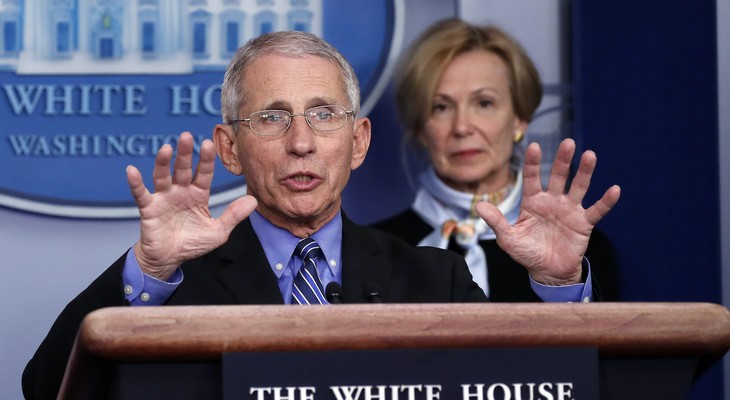The Coronavirus Death Rate Is MUCH Lower Than the Estimates Justifying the Lockdowns...

Article by Matt Margolis in "PJMedia":
Appearing on Justice with Judge Jeanine on Saturday night, Dr. Debora Birx admitted something that anyone paying attention to the coronavirus pandemic has known for some time now. “I think we underestimated very early on the number of asymptomatic cases,” Dr. Birx said. “And I think we’re really beginning to understand there are people that get infected that those symptoms are so low-grade that they don’t even know that they’re infected.”
But, first, let’s go back to what experts said originally. Back in March, the World Health Organization (WHO) estimated a 3.4 percent fatality rate and Dr. Anthony Fauci estimated that the fatality rate of the coronavirus was about 2 percent. “If you look at the cases that have come to the attention of the medical authorities in China, and you just do the math, the math is about 2%.”
Some of us will remember how President Trump endured a lot of criticism for saying that he had a “hunch” that the WHO’s estimate was too high and that the fatality rate of the coronavirus might actually be below 1 percent. “Well, I think the 3.4 percent is really a false number. Now, and this is just my hunch, and — but based on a lot of conversations with a lot of people that do this. Because a lot of people will have this and it’s very mild. They’ll get better very rapidly. They don’t even see a doctor. They don’t even call a doctor,” Trump said. “I think that that number is very high. I think the number, personally, I would say the number is way under 1 percent.”
There have actually been at least five studies that found the coronavirus has a fatality rate of less than one percent, just like Trump said.
None of these studies were perfect. Some are large, some are small. As you’ll see, they came up with a range of fatality rates, but considering our country was shut down over the belief that the coronavirus had a CFR of 2% to 3.4% and all of these studies suggest the actual CFR is under 1 percent, it makes you wonder why the country was shut down.
5. The Stanford University Study
In mid-March, Standford University professors Eran Bendavid and Jay Bhattacharya wrote in the Wall Street Journal that current estimates about the fatality rate of the coronavirus “may be too high by orders of magnitude.”“On March 6, all 3,300 people of Vò were tested, and 90 were positive, a prevalence of 2.7%,” the professors wrote. “Applying that prevalence to the whole province (population 955,000), which had 198 reported cases, suggests there were actually 26,000 infections at that time. That’s more than 130-fold the number of actual reported cases. Since Italy’s case fatality rate of 8% is estimated using the confirmed cases, the real fatality rate could in fact be closer to 0.06%.”
The fatality rate of the seasonal flu is .1 percent.
4. The Santa Clara Antibody Testing Study
A large-scale antibody study in Santa Clara County in California headed by a Stanford University professor, Dr. Eran Bendavid, last month found that the actual number of positive coronavirus infections is likely 50-85 times higher than confirmed cases.The study tested 3,330 Santa Clara County residents, and those tests found that 2.49% to 4.16% of the subjects had coronavirus antibodies. “These prevalence estimates represent a range between 48,000 and 81,000 people infected in Santa Clara County by early April, 50-85-fold more than the number of confirmed cases.” Based on the range of infection, the coronavirus has a fatality rate between .09 percent and .14 percent.
You can read the study here.
3. The New York Antibody Testing Study
According to the preliminary results of the coronavirus antibody testing released by Governor Andrew Cuomo for the State of New York, 13.9 percent of New Yorkers likely had the coronavirus. According to CNBC, “The state randomly tested 3,000 people at grocery stores and shopping locations across 19 counties in 40 localities.” Of course, downstate counties had higher rates of positive antibody test results,Based on their findings, approximately 2.7 million New York State residents had the coronavirus. At the time the study was released, there were 19,453 deaths in New York State attributed to the coronavirus, which comes out to a .72 percent fatality rate.
2. The Massachusetts Antibody Testing Study
A study in Massachusetts had an even higher rate of infection for the coronavirus antibodies. A Mass General Hospital study of 200 residents in Chelsea, Mass., using a rapid test found that 30 percent of those who participated had the antibodies. Chelsea is described as the epicenter of the crisis in Massachusetts, so its rate of infection is likely higher than the entire state, but if we assume that 30 percent number applied statewide, we’d get approximately 2,070,000 infections, and based on the number of coronavirus deaths at the time this study was released (1,560), we’d get a fatality rate of .08 percent.1. The Lancet Infectious Diseases Study
A study published at the end of March in The Lancet Infectious Diseases medical journal acknowledged that those early estimates were too high (because they were based on the case fatality rate and didn’t account for undiagnosed cases) and estimated that the fatality rate of the coronavirus is actually .66 percent.Adjusting for demography and under-ascertainment, we estimate an infection fatality ratio of 0.66% (95% CrI 0.39–1.33). As for the case fatality ratio, this is strongly age-dependent, with estimates rising steeply from age 50 years upwards. The demography-adjusted and under-ascertainment-adjusted proportion of infected individuals requiring hospitalisation ranges from 1.1% in the 20–29 years age group up to 18.4% in those 80 years and older (Emphasis added)You can read the full study here.
https://www.thelancet.com/journals/laninf/article/PIIS1473-3099(20)30243-7/fulltext
https://pjmedia.com/news-and-politics/matt-margolis/2020/05/03/at-least-five-studies-have-shown-that-the-coronavirus-fatality-rate-is-under-1-percent-n387776




Post a Comment